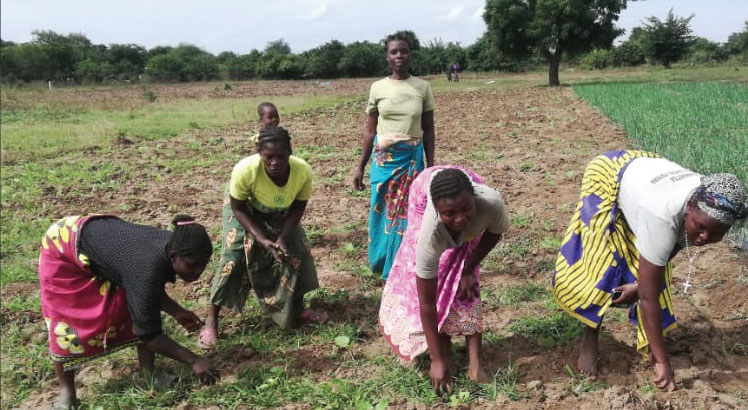Women lead in restoration
Bertha Malefula, 28, from Traditional Authority Maseya in the flood-prone district of Chikwawa, experienced two devastating floods in January.
The mother of three recalls a less-storied flood hitting her area just over a week before she watched floods caused by Tropical Storm Ana washing away “everything” she worked hard for.
Her family was among the 43 943 people displaced by cyclones Ana and Gombe who sought shelter in congested camps across the worst hit southern districts.

“I lost everything, including my house, and we stayed at Bande camp for three months. Life in the unsanitary evacuation camp was so unbearable, especially to women. There was no privacy. People scrambled for food. We lacked clothes and other basic necessities,” she recounts.
The disaster was a heavy blow to the woman who was working with Chikwawa District Council and other non-governmental organisations on projects to mitigate the harsh effects of climate change. She says her community never anticipated the severe damage that rendered all their efforts useless.
The Department of Disaster Management Affairs (Dodma) indicates that Cyclone Ana affected 51 134 women in Chikwawa, the worst-hit district in Malawi.
Local solution
Desperate to rise from the tragedy and start rebuilding, Malefula mobilised her fellow women and formed Namatope Cooperative which returned to the flooded wetlands to replant.
The group of 30 members, with support from Chikwawa District Agriculture Development Office, is harnessing the abundant moisture and fertile alluvial soils left by the floods for winter cropping. They grow maize, vegetables and legumes on 30-hectare riverine field to beat hunger and build back better.
The women’s group also runs an irrigation scheme and a fish pond using harvested floodwater.
They use modern farming technologies such as conservation agriculture to improve their crop yields and conserve soil in line with the African Green Stimulus Programme pillar seven. The pillar promotes efforts scaling up climate-smart agriculture and food security systems.
Malefula narrates: “We identified the root cause of our problem and decided to face it head-on.
“Through irrigation, we want to get three harvests a year. This will help our homes become food sufficient and generate income for improved livelihoods. With the money, we can buy land upland and build strong houses to reduce the loss and damage caused by climate shocks.”
Market links
The chairperson of Namatope Cooperative and her group have embarked on efforts to restore the catchment area of the heavily silted Mwanza River, which frequently subjects them to floods.
Madalitso Makondi, agriculture gender roles and extension support services officer in Chikwawa, says the public office is working closely with the group to establish lucrative markets for them.
He explains: “The major challenge is lack of markets, so we plan to link the women’s group with those who could be buying their produce in bulk.
Engaging councils
We are searching for a lasting solution to the challenges that people in flood-prone areas face. Food handouts are not sustainable but allowing them to produce crops themselves could bring a greater impact.”
Dodma reports that the Government of Malawi requires K72.7 billion to fully respond to the effects of Ana, but only mobilised K34.8 billion.
Dodma is engaging local governments in disaster-prone districts such as Chikwawa, Nsanje, Mwanza and Phalombe to promote local solutions to build resilience and end perennial impacts of disasters fuelled by climate change.
Commissioner for disaster management affairs, Charles Kalemba, says the partnership with district councils is in line with the global Sustainable Development Goals (SDGs) to combat climate change and its impacts by 2030.
Looking back, he regrets that building resilience has not been at the centre of development planning and national development.
He states: “Oftentimes, when disasters strike, we pretend to be taken by surprise and start mobilising resources for response.
“However, we cannot continue talking about building resilience without tangible actions on the ground. The time to act is now. We have talked a lot. We have held enough workshops. At the speed of the storms and cyclones, I don’t think we have the luxury to continue doing that.”
Dodma reports that cyclones Ana and Gombe killed 85 people and affected 1 154 298 others in the Southern Region.
Women matter
In a UN report, Why Gender Matters, UN Environment Programme (Unep) executive director Inger Andersen says women are vital for the management and sustainable use of land and biodiversity.
The strides of the Namatope Cooperatives show that transforming the balance of power and working for gender equality is key to meeting the Sustainable Development Goals.
This article is part of AWiM/Unep Africa EnvironmentalJournalism Programme





